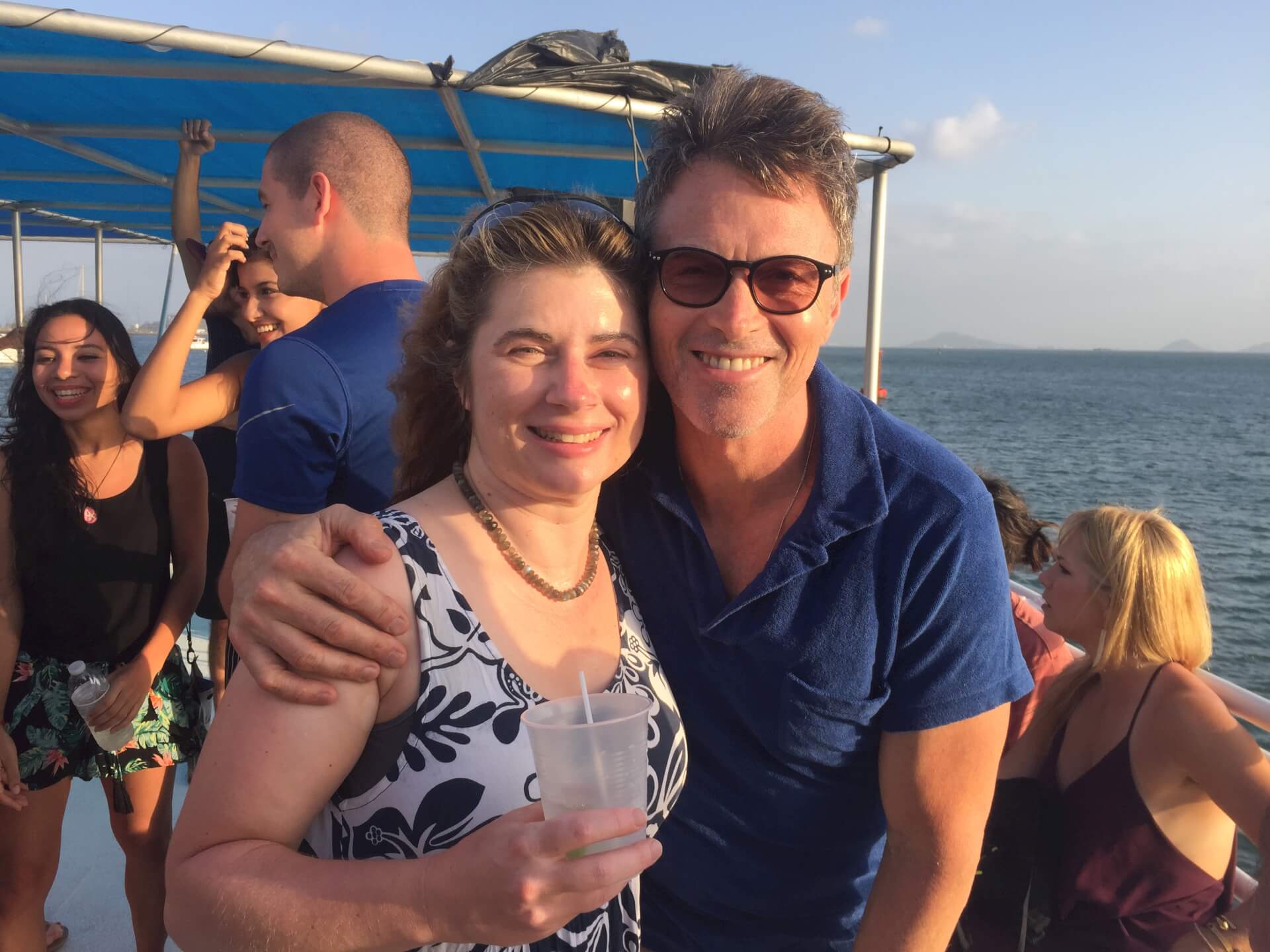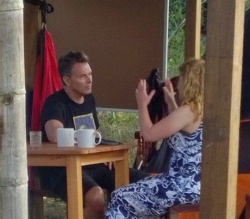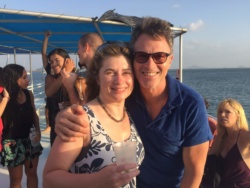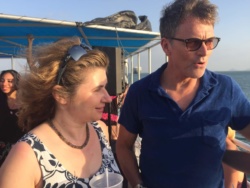The Creative Connection: Actor Tim Daly & NASA Astronomer Michelle Thaller
A conversation between HATCHers Tim Daly and Michelle Thaller during the inaugural HATCH Latin America at Kalu Yala in the Panamanian rainforest. February 19th, 2016.
Tim Daly is most recently known for his current role on CBS’ political drama television series Madam Secretary , and has been a leading advocate for STEAM (science, technology, arts, and math) education in public schools as President of the Creative Coalition .
Michelle Thaller is a revered astronomer and research scientist, as well as the Assistant Director for Science Communication at NASA’s Goddard Space Flight Center.
Both Tim and Michelle share a passion for promoting the importance of creative practice, and for helping others find their unique means of self-expression.
Tim: “I read an article that you wrote, about how we are all the stuff of stars. And I love that, because that’s very similar to what I believe about arts – that we’re all together; that we have to find ways to reach each other and find what’s common in each other as human beings. Breaking it down to ‘we’re all made out of the same things’ is the ultimate way of describing that.”
Michelle: “Absolutely. People seem to be searching for a way to be connected to each other…we’re sort of looking for a tribe to belong to, I think. The thing that’s so incredible about science is that this doesn’t come down to a belief system, this is actually factually true…In you right now is the entirety of the galaxy… And as human beings we’re not only completely the same creatures person-to-person, we’re the same things as the rocks, as this planet.”
Tim: “It’s interesting to me, you saying that we’re all made of the same stuff – I believe that’s true emotionally also. I believe in each of us is the same potential for good, for evil, for sadness, for love, for joy, for kindness, for empathy. And it’s one of my missions as an actor and a proponent of the arts to find those things, and to tell those stories to people so they can understand we’re so much more alike than different…
It’s occurred to me how similar we are in terms of our curiosity; in terms of the way we pursue our passion, and we’ve had a lot of agreement about the importance of artistic thought and out-of-the-box thinking. And I love that you as a scientist get that. I’d love to know why you think that people don’t give scientists the credit for being as artistic, as creative, and as innovative as they are often.”
Michelle: “The assumptions people make about us – when I walk in to a room and say ‘I’m a scientist’, and you say ‘I’m an actor’ – have been some of the more difficult things for me to deal with in my life. You know, the idea that as an actor you must be a certain way, and as a scientist I must be a certain way. The question about bringing in creativity – to me it was never separate from science.
There is not a certain mindset needed to be a scientist. The idea that science needs to be done by a certain type of person, I think, extends to the arts as well – you know ‘who can be an artist?’ or ‘who can be a musician?’, and thinking ‘well I’m not the right kind of person to do that’ is one of the most damaging things that happens. What are some of the assumptions people have put on you when they know that you’re an actor?
Tim: “Well, first of all, because I’m successful they assume I was born successful – like I came from the womb starring on a TV show. And they don’t know anything about the other things that furnish my life; about the other jobs I’ve had, the struggles, or the other interests. They write a biography that’s 98% of the time so different from the way I was raised and what my experience was in becoming an adult.
The ratio of d#$chebags to responsible human beings is the same in every profession. I’m sure you know plenty of scientists who are hot messes. It’s just that you don’t have cameras on you. Most of the actors I know are great people who have persisted in something that is very difficult, and have had to endure a lot of rejection…I think that what we’re proving here is that we’re all a lot more alike than different if we just scratch the surface a little bit.”
Michelle: You said something that really resonated with me there when you talked about persistence and rejection. I mean, it never, ever doesn’t hurt. We’ve all heard that in order to be successful you need to be comfortable with failure…I think the ‘sameness’ we need to talk about is that the rejection never got easy for me, some of these things never stop being difficult but that doesn’t belong there; that you shouldn’t be doing this thing that’s difficult for you. Even if it never becomes easy.”
Tim: “One of the things that I like to try to practice is to be thankful for all of it. To be thankful for my success, to be thankful for blessings that have been bestowed upon me – and also to be thankful for the pain and for the sadness. Thankful for everything that makes up a life. And I find that if I can accept that, the pain of a rejection or failure is a lot easier to deal with. It’s not that I want to push it away – but I want to have it go through me a lot quicker and not get caught.”
Michelle: Creativity in the arts and in science is sometimes treated like this magical fairy – that it’s something that touches you, or it doesn’t. You used the analogy of creativity as a muscle; that it’s something you can train.
Tim: “I said that creativity is a muscle. The arts are the gym. If you want strong muscles in creativity, you’ve gotta go to the gym of the arts to make them strong. And then once you have the muscle, you can use it for medicine, you can use it for law, or government or anything else. But the muscle of creativity is trained by the things the arts innately do to expand your mind and your imagination.”
Michelle: And for me the gym is science. What people don’t understand about science is that, at its very core, it’s really owning your own curiosity. The idea that science is a body of knowledge – of things you need to memorize – is generally something scientists fight really, really hard… The idea that science is just continuously asking the questions and trying to figure out which the best answers are – and even which is the best answer right now, because we know there’s answer coming that is better and even closer to the truth. We don’t have the gift of keeping creative and asking the next question.”
Tim: “I think the same is true for artists. They have a burning curiosity about what is the emotional truth for human beings, and it can be arrived at in a lot of ways…For me, music is the most accessible. Mostly everyone I know has a song they can put on that will bring tears to their eyes, somehow their emotions will be released and they will feel deeply. Visual art, for me, is the most elusive – but I know I’ve had the experience of walking through a museum and suddenly being stopped in my tracks by a painting that moves me so profoundly. And I don’t know why, but I know that – for me – that painting is telling me an emotional truth, and it connects me to humanity. It connects me to all the people who have walked before who have had those powerful feelings.
I am, and I think most artists are, fascinated by what makes people tick – what makes them feel things? In that way, I think scientists need artists, because I think that they can be helpful in putting into a human context the story of the universe that you are discovering bit-by-bit…and help make people care about it. I find it to be powerful and moving to know that this little chirp happened in space, and suddenly we know a lot more than we did 100 years ago when there was a theory – and that there’s more coming.”
Michelle: “Absolutely. The beauty is what gets me. The New Horizons spacecraft swung by Pluto last summer, and I had never expected Pluto to be so beautiful – the 10,000 foot high mountains of ice, the glaciers of methane and nitrogen. My first response was the artistic, emotional response of the beauty…
- Painting by Donald Fox
- Painting by Escha Van Den Bogerd
- Ice mountains on Pluto
- 2015 New Horizons image of Pluto
We were talking about creativity, and your response to things and it goes back to the issue of fighting the idea that you have to be creative from the start…that there isn’t a journey. When honestly, I never expect to get to the end of that journey…I just let go of that and let life wash over me.”
Tim: “Creativity is a practice. It’s like yoga or anything else that you have to keep doing…whatever your curiosity is, you have to keep doing that. I think that’s the key to keeping your imagination alive, and imagination is the key to all of it – to making the leap to understanding how someone else feels or how they see things.”
Michelle: Do you have a favorite life hack or something you’ve learned along the way that you really wish you could instill in younger people?
Tim: “Yeah, first I need to say that I hate bumper stickers, you know? It’s like you read them and their so short and so true and it just kind of pisses me off. But, I had this weird experience a few years ago when I decided to climb Mount Kilimanjaro, and I was really out of shape and at sort of a low point – and I said to myself, ‘you know what – I promise if I make it to the top I’m going to have an epiphany.’ Like, the skies will open up and rainbows will happen kind of epiphany. And I make it to the top and I’m annoyingly fine. And I’m waiting for my epiphany…and nothing. And I think ‘Dammit. All this way and no epiphany’, and I’m sort of pissed…
So I’m on my way down – I’m on like my 12th hour of hiking, I’m trudging along. and I suddenly go ‘ok, d#$chebag – there it is. There’s your epiphany’ And it’s a bumper sticker; ‘It’s the journey’. You never get anyplace, it’s all about the practice of keeping going and keeping on. And if I was to impart anything on young people it would be don’t worry about getting someplace. Just keep going.
The only other thing I would say is, if you have a dream make sure you have several spare dreams behind it. Because sometimes your dreams come true; it’s happened to me several times. And if you don’t have another dream to replace it then you’re unmoored and you’re wandering. So have one dream and go after it – then be ready with your spare dream.”
Michelle: “Yes. Absolutely. I like that.”
Check out Michelle’s Innovation Crush interview with fellow HATCHer Chris Denson:







